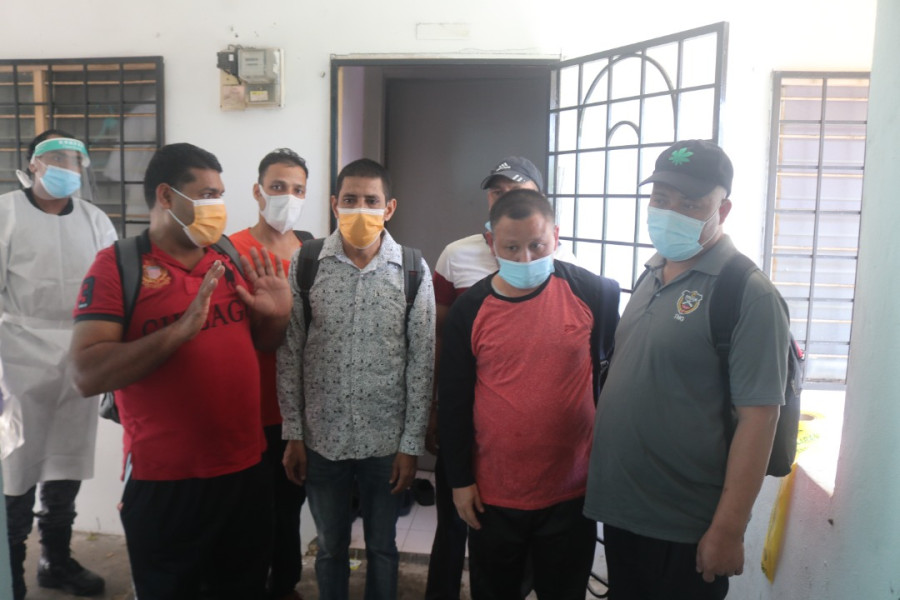National
Six Nepalis rescued from forced labour in Malaysia
The workers had been denied jobs and money for months, much like many Nepali migrants exploited in foreign labour destinations.
Chandan Kumar Mandal
Without work and money for months, six Nepali migrants have been rescued from what looked like forced labour conditions in Malaysia.
The Malaysian authorities on Friday rescued the Nepalis, who had been working as security guards in the Southeast Asian country, after investigations by the Immigration Department showed they had been exploited.
The Star, a local English newspaper, reported that the six men, aged between 30 and 40, were rescued in an operation by the local authorities.
“Based on information gathered and surveillance, an inspection was conducted at a worker’s hostel,” the newspaper quoted Immigration director-general Datuk Khairul Dzaimee Daud as saying. “Six Nepalese men were found inside, with the hostel in a decrepit and uncomfortable state.”
The immigration authority found that they were neither paid nor given work for nearly six months. The workers alleged that their employer had also not given them any money to meet their daily needs, according to the local media.
ILO Forced Labour Convention, 1930 (No. 29) defines forced or compulsory labour as “all work or service which is exacted from any person under the threat of a penalty and for which the person has not offered himself or herself voluntarily”.
The UN agency differentiates forced labour from substandard or exploitative working conditions. Various ILO indicators like restrictions on workers’ freedom of movement, withholding of wages or identity documents, physical or sexual violence, threats and intimidation or fraudulent debt from which workers cannot escape determine when a situation amounts to forced labour.
The exploitation of Nepali workers by employers in Malaysia and Persian Gulf countries has been going on for several years. Tens of thousands of workers go without pay and jobs and are forced to do work different from what they were promised in the hiring phase.
“Nepali workers' exploitation in labour destinations is not even a new thing anymore. Nepali workers in the latest case faced wage theft, which is an element of forced labour,” Swarna Kumar Jha, a labour migration expert, told the Post.
“Such issues were hidden before, despite there being frequent reports of such incidents in labour destination countries including Malaysia. The Covid-19 pandemic brought these issues to the fore like never before after workers’ contracts were terminated arbitrarily and they were sent home unpaid.”
Covid-19 hit tens of thousands of Nepalis abroad as they faced reduced working hours, endured drop in regular incomes, and many had to return home, most of them bearing the cost of expensive air tickets themselves.
According to Jha, Friday’s rescue of six Nepalis from forced labour shows the problem prevails in Malaysia as well despite both countries signing a landmark labour agreement in 2018.
“There could be more workers who are going through forced labour situations,” said Jha, who is also a coordinator at the National Network for Safe Migration, a grouping of organisations working to promote safer migration and rights of migrant workers. “The Malaysian authority saying these workers were victims of forced labour proves it further.”
The victims had told the Malaysian authorities that their employer had refused to meet them despite numerous requests to do so.
“They have been given protection and placed in a safe house. The employer and company owner have been called to give their statement,” said Khairul. “The case is being investigated under Section 12 of the Anti-Trafficking In Persons and Anti-Smuggling of Migrants Act 2007 for human trafficking.”
Many Malaysian companies, mainly glove manufacturing firms, have started reimbursing all the costs and related fees paid by migrant workers to ensure zero cost jobs and to meet international standards against forced labour and modern-day slavery. The Malaysian authority’ recent action could be a signal towards the local government and employers trying to revamp their image, according to Jha.
“They must be trying to give out a message that they are committed to safeguarding rights of migrant workers,” said Jha. “After all, they also need a cheap labour force which comes from countries like Nepal.”




 8.22°C Kathmandu
8.22°C Kathmandu














